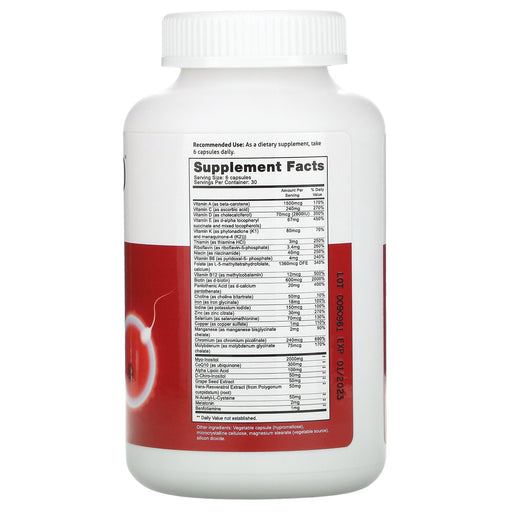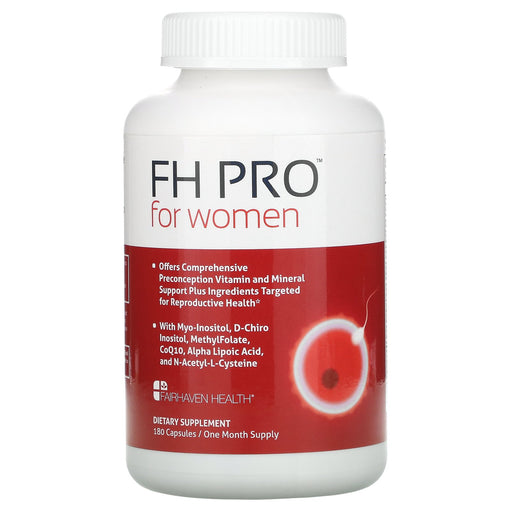
Supporting Reproductive Health and Optimizing Fertility Naturally
For women seeking to optimize their reproductive health and enhance their fertility, natural supplements can provide valuable support alongside a balanced diet and healthy lifestyle. By nourishing the body with essential vitamins, minerals, and herbal extracts, women can create a foundation for optimal fertility and overall well-being.
Understanding Women's Fertility
Women's fertility is influenced by a complex interplay of hormonal, nutritional, and lifestyle factors. To support optimal fertility, it's essential to focus on several key aspects of reproductive health:
- Hormonal Balance: Maintaining a balance of reproductive hormones, such as estrogen, progesterone, and follicle-stimulating hormone (FSH), is crucial for regular ovulation and overall fertility.
- Nutrient Intake: Adequate intake of essential vitamins and minerals, such as folate, vitamin D, and zinc, is necessary for reproductive health and fetal development.
- Stress Management: Chronic stress can disrupt hormonal balance and negatively impact fertility. Managing stress through relaxation techniques, exercise, and self-care is essential for optimal reproductive health.
- Healthy Lifestyle: Maintaining a healthy weight, avoiding tobacco and excessive alcohol consumption, and engaging in regular physical activity can all contribute to improved fertility and overall well-being.
Key Supplements for Women's Fertility Support
When selecting supplements to support women's fertility, look for products that contain evidence-based ingredients known to promote reproductive health, such as:
- Folate: This essential B vitamin plays a crucial role in fetal development, helping to prevent neural tube defects. Adequate folate intake is important for women of reproductive age, especially those planning to conceive.
- Vitamin D: This fat-soluble vitamin is involved in various aspects of reproductive health, including hormonal balance and immune function. Vitamin D deficiency has been linked to reduced fertility and adverse pregnancy outcomes.
- Myo-Inositol: This naturally occurring compound belongs to the B vitamin family and has been shown to support ovarian function, improve egg quality, and promote hormonal balance, particularly in women with polycystic ovary syndrome (PCOS).
- Chasteberry (Vitex agnus-castus): This herbal extract has been traditionally used to support female reproductive health by promoting hormonal balance and regulating the menstrual cycle.
- Zinc: This essential mineral plays a vital role in reproductive health, contributing to the production and regulation of hormones, as well as supporting egg quality and overall fertility.
Women's Fertility Supplements and Related Vitamins
To further enhance the benefits of women's fertility supplements, consider pairing them with additional vitamins and minerals that work synergistically to support reproductive health and overall well-being, such as:
- Vitamin E: This fat-soluble vitamin acts as a powerful antioxidant, protecting reproductive cells from oxidative stress and supporting egg quality and fertility.
- Selenium: This trace mineral works together with vitamin E to provide antioxidant protection and support immune function, which is essential for reproductive health.
- Omega-3 Fatty Acids: These healthy fats, found in fish oil and other sources, help regulate inflammation and support hormonal balance, which is crucial for optimal fertility.
- B Complex Vitamins: In addition to folate, other B vitamins, such as vitamin B6 and vitamin B12, play important roles in reproductive health by supporting energy metabolism, hormone production, and fetal development.
Choosing High-Quality Women's Fertility Supplements
When selecting women's fertility supplements, it's essential to choose high-quality products from reputable brands. Consider the following factors:
- Evidence-Based Ingredients: Look for supplements that contain clinically researched ingredients at effective doses, ensuring optimal safety and efficacy.
- Purity and Quality: Choose supplements manufactured in GMP-certified facilities, free from contaminants and harmful additives, and third-party tested for purity and potency.
- Comprehensive Formula: Consider supplements that provide a blend of essential vitamins, minerals, and herbal extracts to support various aspects of reproductive health.
- Brand Reputation: Select supplements from trusted brands with a history of producing effective, science-backed women's health products and a commitment to transparency and quality.
Incorporating Women's Fertility Supplements into Your Reproductive Health Plan
To maximize the benefits of women's fertility supplements, consider the following tips:
- Consult with a Healthcare Professional: Before starting any new supplement regimen, consult with a healthcare provider specializing in reproductive health to determine which products and doses are appropriate for your individual needs and health status.
- Pair with a Balanced Diet: While supplements can help fill nutritional gaps, they should be used in conjunction with a balanced, nutrient-dense diet that includes a variety of whole foods, such as leafy greens, whole grains, lean proteins, and healthy fats.
- Implement Lifestyle Changes: Supplement use should be combined with positive lifestyle changes, such as managing stress, maintaining a healthy weight, and engaging in regular physical activity, to support optimal fertility and overall well-being.
- Be Patient and Consistent: Enhancing fertility naturally may take time. Be patient and consistent with your supplement use and lifestyle modifications to allow your body the opportunity to respond and achieve balance.
Empower Your Fertility with Targeted Nutritional Support
Ready to take a proactive approach to your reproductive health and fertility? Experience our collection of premium women's fertility supplements and find the targeted support you need to optimize your well-being and enhance your chances of conception.
Our women's fertility supplements are carefully formulated with evidence-based ingredients and manufactured to the highest quality standards, ensuring that you receive the best possible support for your reproductive health. Whether you're looking to regulate your menstrual cycle, improve egg quality, or promote overall hormonal balance, our supplements can help you on your journey.
Remember, while supplements can be a valuable tool in your fertility toolbox, they should be part of a comprehensive approach that includes a balanced diet, healthy lifestyle habits, and guidance from a qualified healthcare provider. By taking a holistic approach to your reproductive health, you can empower your body's natural fertility and increase your chances of achieving your family-building goals.
Start your journey towards optimal fertility and reproductive well-being with our premium women's fertility supplement collection. Browse our products today and take the first step towards nourishing your body, supporting your fertility, and embarking on the path to parenthood.
Frequently Asked Questions about Women's Fertility
1. What is the best fertility supplement to get pregnant?
The best fertility supplement to get pregnant may vary depending on individual needs and the underlying causes of fertility issues. However, some supplements that may support fertility include:
- Folic acid: Helps prevent birth defects and supports healthy fetal development
- Coenzyme Q10: May improve egg quality and ovarian function
- Vitamin D: Helps regulate hormone levels and supports overall reproductive health
- Omega-3 fatty acids: May help improve egg quality and reduce inflammation
- Myo-inositol: May help improve ovulatory function and egg quality, particularly in women with PCOS
2. How can I boost my fertility to get pregnant?
There are several ways to boost fertility and improve your chances of getting pregnant:
- Maintain a healthy weight through a balanced diet and regular exercise
- Reduce stress through relaxation techniques like meditation or yoga
- Get enough sleep to help regulate hormone levels and support overall health
- Avoid smoking, excessive alcohol consumption, and exposure to environmental toxins
- Take a prenatal vitamin containing folic acid to support healthy fetal development
- Track your menstrual cycle to identify your fertile window and time intercourse accordingly
- Consider supplements that may support fertility, such as CoQ10, vitamin D, or myo-inositol
3. What is the best pill that helps a woman get pregnant?
There is no single "best pill" that helps a woman get pregnant, as fertility needs vary between individuals. However, some medications that may be prescribed to help improve fertility include:
- Clomiphene citrate (Clomid): Stimulates ovulation in women with irregular cycles or ovulatory disorders
- Letrozole (Femara): An aromatase inhibitor that may help stimulate ovulation, particularly in women with PCOS
- Gonadotropins: Injectable hormones that directly stimulate the ovaries to produce eggs
- Metformin: May help improve ovulatory function in women with PCOS by regulating insulin levels
It is essential to consult with a healthcare professional to determine the most appropriate medication for your specific fertility needs.
4. Which medicine is best for female fertility?
The best medicine for female fertility depends on the underlying causes of fertility issues and individual needs. Common medications used to support female fertility include:
- Clomiphene citrate (Clomid): Stimulates ovulation in women with irregular cycles or ovulatory disorders
- Letrozole (Femara): An aromatase inhibitor that may help stimulate ovulation, particularly in women with PCOS
- Gonadotropins: Injectable hormones that directly stimulate the ovaries to produce eggs
- Metformin: May help improve ovulatory function in women with PCOS by regulating insulin levels
It is essential to consult with a healthcare professional to determine the most appropriate medication for your specific fertility needs.
5. What foods increase fertility?
Certain foods may help support fertility by providing essential nutrients and promoting overall reproductive health:
- Leafy greens: Rich in folate, which is important for healthy fetal development
- Whole grains: Provide complex carbohydrates and fiber, which can help regulate hormone levels
- Lean proteins: Support overall health and provide amino acids necessary for hormone production
- Healthy fats: Found in foods like avocados, nuts, and fatty fish, and may help improve egg quality
- Antioxidant-rich fruits and vegetables: May help protect reproductive cells from damage caused by free radicals
Incorporating a variety of nutrient-dense foods into a balanced diet can support overall fertility and reproductive health.










